Request Information
Ready to find out what MSU Denver can do for you? We’ve got you covered.
1.1. Welcome
Welcome to the Metropolitan State University of Denver College of Business! We have a wide variety of undergraduate and graduate programs, small classes, dedicated faculty, and a reputation for producing excellent graduates. We’re also recognized nationally for our excellence, including accreditation by AACSB—a marker of quality earned by the top 5% of business schools globally—and a number of prestigious accreditations and awards for our various departments and programs.
1.2. About This Guide
This guide will help explain your degree requirements, show you where to find information and resources to help you survive and thrive in college, and answer frequently asked questions (FAQs). It is designed primarily for new students (first-year, transfer, and readmitted students) and prospective students, but the information is also relevant to continuing students.
Ultimately, you are responsible for understanding and meeting all of your degree requirements—and making academic choices that help advance you toward your career and life goals.
Additionally, you are strongly encouraged to contact or come visit an academic or faculty advisor with any questions. Contact information for our advisors is in Appendix J, on the last page. You can also find their contact information, and schedule an appointment, at: https://msudenver.edu/business/advising/
1.3. University Catalog and Your Catalog Year
The university catalog is the ultimate authority on major requirements, graduation requirements, course information, university policies, and more. The catalog is available at: http://catalog.msudenver.edu/
There are changes to the catalog every year, and you are automatically assigned to the catalog that was in place the year you started at MSU Denver. You are eligible to change your catalog year to any catalog after you started at MSU—for instance, to take advantage of a new major, minor, or certificate. Note, though, that you must complete ALL of the requirements for ALL of your degree components (major, minor, certificate, etc.) for the catalog year you choose. So it’s important to know which catalog you’re following and to make any changes to your catalog year in consultation with an advisor.
Do not get academic advising from your peers; among other problems, they may not be following the same catalog as you are!
You can find your catalog year on your Degree Progress Report (DPR). See Section 1.5 (below) for how to find your Degree Progress Report and Appendix B (below) for information on how to read your DPR. Re-admitted students will fall under the newer catalog for the year in which they were re-admitted. It is possible to be rolled back to your old catalog, but you will need to see an academic advisor.
1.4. Finding the Right University Catalog
University Catalogs are available online going back to 2008-09 at: http://catalog.msudenver.edu. From there, use the pull-down menu to select your catalog year. See Figure 1.1.
Figure 1.1: Finding Online Catalog for Specific Year
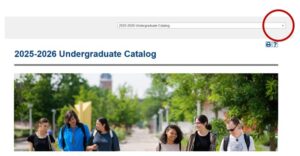
1.5. Your Degree Progress Report (DPR)
Your Degree Progress Report (DPR) is a fast and easy way to review your degree requirements, figure out which classes you still need, and see your academic process. It also shows your catalog year and any unmet degree conditions (for example, the 30-hour College of Business residency requirement).
You can find your DPR at the top of your Student Hub, at https://www.msudenver.edu/studenthub/ under WEB SERVICES. See Figure 1.2.
Your Degree Progress Report has advanced functions including a GPA Calculator, “What If” Button (for instance, to help decide on a major or plan for catalog year changes), and Look Ahead to see how future classes will fit into your degree.
See Appendix B (below) for how to read and understand your DPR and use the advanced DPR functions.
Figure 1.2: Getting to Your Degree Progress Report
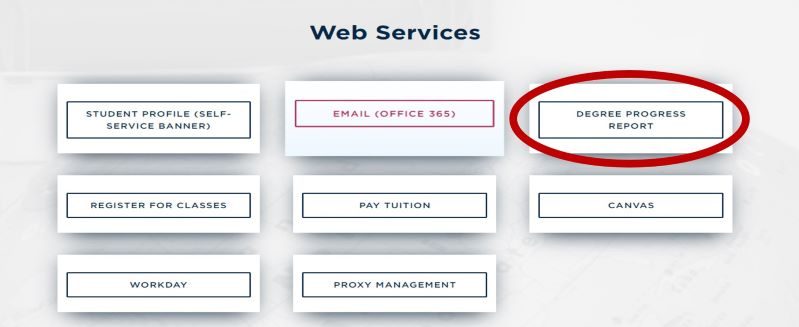
1.6. College of Business Advising Resources and Tools
In addition to the catalog and DPR, students have many other academic success and degree planning tools, including: Degree Worksheets, major-specific Information Sheets, the General Studies Approved Courses Handout, the Course Recommendation Form, and your academic advisor.
Degree Worksheets: List required courses by major (including General Studies, Major, Additional Business Requirements, and Business Core classes). It also provides a semester-to-semester guide for students on a 4-year graduation plan (see the back of form).
You can pick up a College of Business Degree Major Worksheet from your academic advisor, academic department (for example, Management or Marketing), or the College of Business reception area near the elevators on the 5th Floor of the Administration Building. You can also find them on the College of Business website under “Advising”. Make sure to use the Degree Worksheet from your catalog year. Do this by checking at the top right corner of the form. See Figure 1.3.
Figure 1.3: Degree Worksheet with Catalog Year Circled
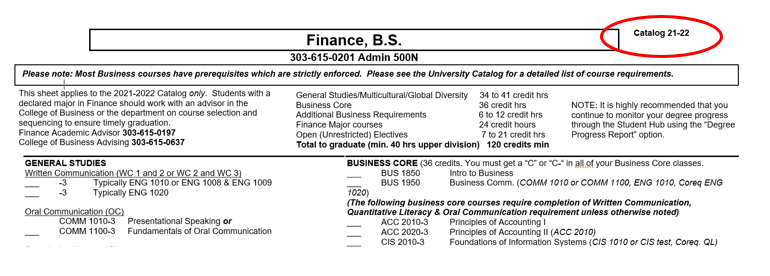
Concentration/Certificate Information Sheets: Most College of Business degrees offer concentration options, certificates, or other programs. To learn about concentration / certificate options for your degree, see Appendix A (below). More information on each is available in the MSU Denver catalog. You can also ask an academic advisor or a CBUS faculty member—or swing by the department to pick up information sheets.
General Studies Approved Courses: These lists in the catalog show you which classes meet specific General Studies categories (for example, the Historical, Arts & Humanities, and Natural & Physical Science). They will also show you which classes meet Ethnic Studies & Social Justice (ESSJ) and Global Diversity (GD) requirements.
Some courses can fulfill multiple requirements. For example, you can take HIS 1150: Race in U.S. History to simultaneously meet both the Historical and the ESSJ requirements.
Most CBUS majors have recommended General Studies requirements. Check your Degree Progress Report, Degree Worksheet, or the University Catalog for more information.
You can pick up a General Studies Approved Courses handout from your academic advisor or at the College of Business Advising Center. General Studies Sheets were also handed out or emailed during Orientation (if you attended an on-campus or virtual session). You can also find approved General Studies courses in the University Catalog and through the Class Scheduler function when you register for classes. If you are a transfer student, you may be able to get General Studies credit for a class that isn’t on the list; see Section 5 (below) for more information on transfer credits.
Course Recommendation Form. The Course Recommendation Form can help you plan out your courses, semester-by-semester, and project your graduation date. You can get one from your academic advisor (or use the copy in Appendix H below). Veterans using the GI Bill should use this form to map out their remaining eligibility and course work.
You should fill out a form and keep it; we also recommend taking a picture of it with your phone and saving the picture. When completing the form, make sure you review course prerequisites which can be found on your Degree Progress Report (online version), your Degree Worksheet, the University Catalog, or in the schedule of classes. Once you fill out the form, schedule an advising appointment so your advisor can review it and make corrections or suggestions.
Your Academic or Faculty Advisor
Your academic advisor is here to help you understand your degree requirements, provide advice and information on MSU Denver academic policies and procedures, assist you with problems like financial aid and academic probation, and help keep you on the right path. We are your cheerleader, coach, advocate, and academic success partner. If you have any questions, need some help finding University resources, or want to review your degree plan, please contact your academic advisor—we genuinely care about you!
CBUS has separate professional academic advisors per department. Generally speaking, freshman, sophomores, new transfers, and recently re-admitted students should see their academic advisor. Continuing juniors and seniors should see a Faculty Advisor to get help with choosing upper division courses/electives, discuss concentration/certificate options, and get advice on becoming career ready or graduate programs. Students needed APLANS, on Academic Notice/Recovery, Graduation Checks, or having other issues should see an professional Academic Advisor (not a Faculty member).
Appendix I (below) includes contact information for CBUS department academic advisors. For department information, see: https://www.msudenver.edu/business/advising/faculty-advising-hours/
2.1. Degree Requirements Overview
As noted above, students should always consult the correct catalog year for the most accurate and detailed information on degree requirements. What follows is a general guide, targeted at students who are on a relatively new catalog (2025 and newer).
General Business Degree Requirements (summary; see catalog for definitive list):
This guide explains the specific ways to meet the more complicated parts of these requirements.
2.2. General Studies Requirements
General Studies courses equip students with intellectual skills in analysis, research, and communication and cover natural sciences, the human condition, aesthetic experience, and global and cultural diversity. To fulfill your General Studies requirements, you must complete (or transfer in) the core classes laid out below:
General Studies Requirements:
Students should ask their academic advisors which general electives are best to help them achieve their specific educational goals. Additional information (prerequisites, course registration tips & instructions, course recommendations, etc.) for your Quantitative Literacy (Math), Written Communication, and Oral Communication General Studies requirements are included in Appendix C through E of this guide (below).
You can find more information on MSU Denver’s General Studies requirements here: https://www.msudenver.edu/generalstudies/
2.3. The Global Diversity Requirement
All MSU Denver students are required to take or transfer in a Global Diversity Elective within their General Studies course work. Global Diversity classes can be identified on the General Studies Approved Courses worksheet by a (GD) after the course title.
You can meet the Global Diversity and a General Studies category with the same class. For example, courses that meet both the Global Diversity requirement and count toward the Natural & Physical Sciences requirement include: MTR 1600 (Global Climate Change), GEG 1910 (Global Water Concerns), and ANT 1010 (Biological Anthropology). Students who take ECO 1776, Global Economic History, can meet both their Historical and Global Diversity requirements.
Veterans who deployed for 6 months or more overseas (and have proof via their DD214) can get credit for their Global Diversity requirement by talking to an Alternate Credit / Prior Learning Specialist. You can find their contact information here: https://www.msudenver.edu/registrar/alternative-credit/
2.4. The Ethnic Studies & Social Justice (ESSJ) Elective Requirement
All MSU Denver students are required to take or transfer in a ESSJ elective (this is different from the Global Diversity requirement). ESSJ elective options are available on the General Studies Approved Courses list and are identified by the (ESSJ) after the course title. You can also find them in the University Catalog. Business Majors can take MKT 3750, Ethnic Representations in Marketing, or ECO 3600, Economics of Social Justice. Ask your academic advisor how these courses fit into your program of study.
The College of Business offers two types of degrees, the Bachelor of Science (BS) and the Bachelor of Arts (BA). The BS degrees require a 3-credit business calculus class, BUS 3040 (Global Corporate Social Responsibility and Sustainability), and a common business core of 12 courses (36 credits), but do not require a minor. Most BA degrees require a minor of at least 18 credits and do not include the Business Core. Professional Selling, a BA degree (available for the 2021-2022 Catalog), is an extended major and does not require a minor.
Students who are pursuing a BS must first complete MTH 1310 (Finite Math), MTH 1311 with MTH 1312 (Finite Math with Lab), MTH 1110 (College Algebra), MTH 1108 &1109 (Stretch Algebra), or MTH 1400 (Pre-calculus). If you have not completed your calculus requirement, you should take MTH 1320, Calculus for Management & Social Sciences (commonly called Business Calculus). If you have already completed Calculus I (MTH 1410; MAT 201/MAT 2410 at a Colorado Community College); or Survey of Calculus (MAT 125/MAT 1400 at a Colorado Community College), you do not need to take additional Math classes. MTH 1080 (Mathematical Modes of Thought), MTH 1210 (Statistics), and MTH 1610 (Integrated Mathematics) do not work as prerequisites for MTH 1320. If you have taken one of these classes, see Appendix D: Quantitative Literacy for your next steps.
Students who are pursuing a BA must complete a 3-credit Quantitative Literacy course. Some majors have suggestions or requirements for which specific classes to take, and some have additional math requirements. As of the 2021-2022 catalog, students pursuing the BA in Global Business Studies are encouraged to take MTH 1210: Introduction to Statistics. Those pursuing the BA in Economics are required to take either MTH 1110 or MTH 1310 and take MTH 1210. Students pursuing a Professional Selling BA are required to take either MTH 1210 or MTH 1310 (or MTH 1311 with MTH 1312).
You are strongly advised to complete your math courses as soon as possible.
BUS 3040 requires junior level status. Students may be waived into the class if they have 57 credit hours completed (or will have 57 credit hours completed by the semester they wish to enroll in the course).
Most Business Core classes require ENG 1010 (or ENG 1008/ENG 1009); ENG 1020; COMM 1010 or COMM 1100; and a college level math class to be completed before you can register for them. Prerequisites will not be waived in any circumstances! If you do not complete these classes within the first 2 or 3 semesters (assuming full time status), you will fall behind.
Every Business Core class except BUS 1850 has prerequisites. Familiarize yourself with them by looking at your degree sheets, your Degree Progress Report, the University Catalog, or talking to your academic advisor. For example, CIS 1010 (or successfully passing the CIS Placement Test) is a prerequisite to CIS 2010; CIS 2010 is a prerequisite to CIS 3300; CIS 3300 is a prerequisite to CIS 3320; and CIS 3320 is a prerequisite to MGT 4950. CIS 3300 is also a prerequisite or co-requisite for several upper division Finance, Management, and Marketing courses.
If you do not take the correct prerequisites in the correct sequence, you may inadvertently delay your desired graduation date. One way to avoid this is to fill out a Course Recommendation Form and discuss it to your Advisor.
To view course prerequisites for a course in your Degree Progress Report, click on the class title. A popup window will appear listing course prerequisites along with a class description. See Figure 3.1.
Figure 3.1: Identifying Prerequisites in Degree Progress Report
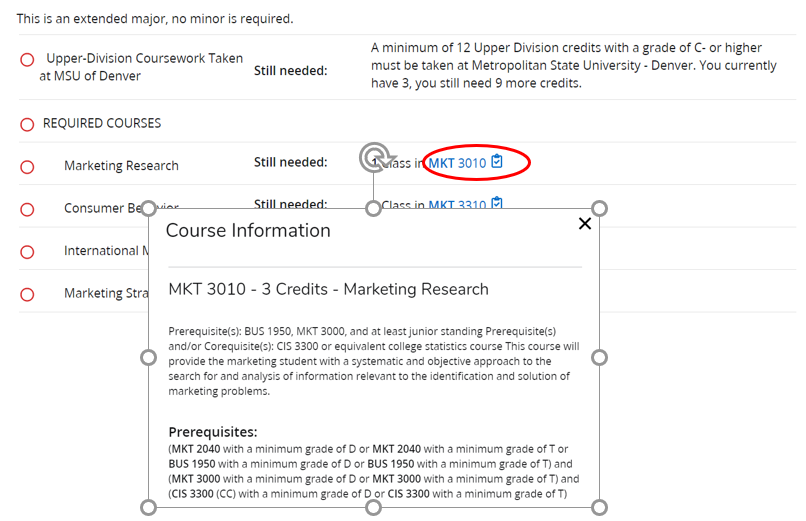
Transfer or readmit students with two or more previous business courses should not take BUS 1850. Instead, take an approved (2000 level or higher) Business class outside your major as a substitute. For example, a CIS major can’t use another CIS course as a substitute for BUS 1850, however, they could take MGT 4830 or MKT 3750. (Note: Finance and Banking students should not take BUS 2250—this course is a lower division equivalent of FIN 3150.)
In addition to the Business Core, all CBUS Bachelor of Science majors require at least 8 additional classes (24 total credits) in the major. See your Degree Worksheets or University Catalog for your specific major’s courses. Several College of Business degrees offer concentrations or certificates (for example, Management offers Human Resources, Entrepreneurship, International Business, Legal Environment of Business, and Ops & Supply Chain Management concentrations). Speak with your academic advisor and with faculty to discuss your options!
Most College of Business Major courses are upper-division and require you to have completed 60 credits before you can take them. (Some students with 57 credits can be waived in.)
Below are the most common issues students run into while trying to complete their College of Business degree as well as tips for avoiding them.

Students who are considering multiple majors should do some or all of the following:
All College of Business full-time faculty and staff (including your academic advisor) are located in the Administration Building, 1201 5th St., Denver, CO 80204. It’s the 5-story brick building across 5th Street from the Auraria West Light Rail Station. Please make an appointment or call ahead, drop-in availability is limited.
Students who passed AP exams conducted by the College Entrance Examination Board may have official scores submitted directly to the MSU Denver Office of Admissions. To see course credit awards and scoring requirements, see the Alternate Credit Options/Prior Learning Assessment section of the University Catalog for your catalog year. To send official AP scores, contact the College Board at https://www.collegeboard.org or 1- 888-225-5427.
MSU Denver may grant course and/or elective credit for prior learning, depending on the academic program, as verified by various assessment methods. The most common sources of credit (besides Concurrent Enrollment, AP, and IB programs) are listed below: Additional information on Prior Learning Assessment (PLA) opportunities is listed in ANNEX I.
1. College-Level Examination Program (CLEP)
2. Military Credit/Defense Activity for Non-traditional Educational Support (DANTES) Subject Standardized Tests (DSST)
3. Portfolio Assessment & Departmental Credit by Examination
Are you trying to decide where to start your college journey? The MSU Denver College of Business is a great choice! We put some of our most gifted and engaged full-time faculty in our freshman-level classes, and you’ll never have a large-lecture class at CBUS, not even in BUS 1850: Intro to Business!
Looking for the right spot to finish your college education? 50% of MSU Denver’s new students are transferring from other institutions, and MSU Denver has been the #1 transfer destination among all the major Colorado Colleges and Universities for the last seven years in a row.
This section will answer FAQs related to both prospective freshman and transfers; potential/actual transfer students should read the entire section.
5.1.1 I am a prospective student. Can I speak with an academic advisor?
Yes! academic advisors are happy to do a preliminary review your transcripts and go over MSU Denver College of Business degree requirements and options. Official transcript reviews can only be done by the Transfer Office. You can also request a Preliminary Evaluation by visiting the Transfer Website and following posted instructions at: https://www.msudenver.edu/transfer-student/. Please call in advance before stopping by. We can do Zoom, Teams, or phone appointments.
If you are looking for career advice, you may want to schedule an appointment with one of the department chairs to discuss your career goals and best options (MBA, Master’s Degree, Professional Certificate, second undergraduate degree, etc.). Faculty and Staff phone numbers are available here: https://www.msudenver.edu/business/advising/faculty-advising-hours/
Make sure you bring unofficial copies of your transcripts.
5.1.2 CAN I COMPLETE MY DEGREE ONLINE?
All College of Business BS degrees can be completed mostly online. Accounting, Banking, Business Administration, Business Intelligence, Management, Marketing and Professional Selling Majors have fully on-line options (although your preferred electives may not be available online). Students can complete all general education requirements with online courses, all of our Business Core classes are available online, and many major courses are also available online.
If scheduling is an issue, you should talk to your department’s academic advisor to see when classes are typically offered and if there are any workarounds (for example, transferring in an online class from a regionally accredited institution).
To accommodate our working students, most required Business courses have online sections, sections that are administered mostly online, and/or night sections. (CBUS night classes usually begin at 5:30 pm.) Students who are unable to come to campus to take exams must work with their individual instructor to see if there is a viable alternate (for example, students can often take exams at local community colleges or can use an online proctoring service for a fee). If you aren’t able to come to campus, you will want to discuss these options with your instructor as soon as possible.
5.1.3 I want to take classes at my local Colorado community college before transferring to MSU Denver; what should I take?
Students interested in pursuing a Bachelor of Science degree in business have an excellent option at any Colorado community college: an Associate of Arts (AA) with Business Designation. This AA goes by different names at different community colleges, such as the AA Business Designation (Community College of Denver), Business Transfer Major AA (Arapahoe Community College, Community College of Aurora), or simply the Business AA (Front Range Community College). Students who complete an AA with Business Designation will be able to earn any BS degree at MSU Denver with no more than 60 additional credits—two more years of full-time study. (Computer Information Systems students who want to graduate in 2 year may be required to take summer courses because of course sequencing.)
Some community colleges have specific articulation agreements with College of Business departments, which allow community college students to pursue an AAS and still finish the corresponding BS degree at MSU with just 60 additional credits. You can find these agreements here: https://www.msudenver.edu/business/advising/agreements-with-other-colleges-colorado/. As of the start of the 2019-20 school year, this includes the following (“*” denotes that these are pending a catalog change at the community college; talk to your advisor there and at MSU):
Older agreements can also often be honored; contact an MSU Denver College of Business advisor for more.
5.1.4 Can I take upper division classes at the community college level?
The short answer is no, MSU Denver doesn’t accept upper division (3000- or 4000-level) credit for courses taken at a community college. Some lower division classes may satisfy requirements that are taught at MSU as upper-division classes. For example, Colorado community college students transferring in MAR 216/MKT 2016 (Principles of Marketing) and/or MAN 226/MAN 2026 (Principles of Management) will received credit for MKT 8900 and/or MGT 8900. MKT 8900 satisfies the MKT 3000 Business Core requirement while MGT 8900 will satisfy the MGT 3000 Business Core requirement. However, neither class counts toward the 40 credit hours of Upper Division classes required for a degree
5.1.5 I don’t want to finish my Associate of Arts, what should I take?
The most urgent courses to complete are your English, Communication, and Math core courses; take these as soon as possible. The following Colorado community college courses are especially useful for transfer students who will pursue any of our business BS degrees. (Parentheticals note MSU Denver equivalencies.) Contact an MSU transfer admissions counselor to discuss courses from other colleges.
You can also take General Studies required classes (for example, your Natural & Physical Sciences or Historical requirement) that transfer to MSU as meeting these requirements.
Whether in business or general education: before taking classes with the intent to transfer them to MSU Denver, be sure to check in with our Transfer Office: https://www.msudenver.edu/transfer-student/
You’ll want to make sure the classes will actually be accepted and will satisfy specific degree requirements. Transfer rules periodically change as a result of course updates.
5.2.1 Do I need to apply to the College of Business?
No, all students accepted by MSU Denver can declare a College of Business major or minor (just fill out the Declaration/Change of Majors and Minors Form). There are no minimum GPA or prerequisite course requirements. Students, however, are expected to maintain Good Academic Standing and follow MSU Denver policies and standards, including student conduct. Students who fail to meet standards may be suspended, receive a permanent F in required courses, or be barred from College of Business classes.
5.2.2 How do I apply to MSU Denver?
Follow the steps on the Transfer Website available at: https://www.msudenver.edu/transfer-student/
5.2.3 I’ve transferred several times; can I just send the transcript from my last institution?
No, students must send official transcripts from all institutions attended in order to get College Credit for courses. For example, if you attended Pikes Peak Community College and then the University of Colorado-Colorado Springs, you will need to send official transcripts from both institutions even though your Pikes Peak classes may appear on the UCCS transcript. If you have AP or IB credit, you will also need to contact the College Board and/or IBO to get your test scores, even if these appear on your previous college’s transcript. (See Section 4.11: How do I bring in my Advanced Placement (AP) or International Baccalaureate (IB) Credits? above for more information.)
5.2.4 How do I know if my transcript has been evaluated?
Students will receive an email from Transfer Evaluation detailing which courses were accepted and which MSU courses are considered equivalent. MSU Denver will only accept college level courses for transfer with grades of “C-“ or better from regionally accredited institutions.
Students can check their Degree Progress Report to see where transferred courses fit into their current major. To check your Degree Progress Report, go to your Student Hub and click on Degree Progress Report. Courses that are complete or were successfully transferred in as a specific class will be annotated with a green box/check mark (if they satisfy a specific requirement) or will be listed under “Additional Courses” block (if they count as general electives).
5.2.5 When should I meet with my academic advisor?
The best time for transfer students to meet with an academic advisor is after you have your student ID number, have successfully set up your online account, and completed orientation. For more on these steps, see: https://www.msudenver.edu/admissions/after-admission/. Ideally, your transcripts will be evaluated, but if your transcript evaluation is still pending, make sure you have an unofficial transcript of all your previous courses (including any classes you are still enrolled in) available when you meet your advisor.
5.2.6 Which orientation session should I attend?
Transfer Students can register for in-person (if offered), virtual orientation through Teams, or online orientation. You will need to complete preregistration and then sign up for orientation on the New Student Orientation website here: https://www.msudenver.edu/otr/. Especially if you only have a few transfer credits, consider signing up for an on-campus (if available) or Teams orientation session instead of the online version to familiarize yourself better with on-campus resources and programs. You must attend orientation or complete the online orientation before you can register for classes.
5.2.7 My transfer course evaluation is still pending, can I still register for classes if my registration window is open?
Yes–provided you meet your advisor with proof of the courses you have completed or are currently taking; usually, an unofficial transcript works. Please call to make an appointment to talk to your advisor; transfer appointments can take up to an hour or longer (especially for international students).
5.2.8 How many credits will MSU Denver accept?
Students beginning at MSU Denver in fall 2022 and later are not limited to the amount of transfer credit that can be accepted from regionally accredited institutions. Students are required to complete the university’s residency requirement.
5.2.9 It appears that not all of my credits were accepted—what can I do about this?
Double check the transfer guidelines to make sure MSU Denver can accept your courses. Some classes will not transfer in even as electives (for example, College Success seminars or remedial courses).
If your class doesn’t fall into one of these categories and still wasn’t transferred in, it may require a department review for credit because it did not have a direct MSU Denver equivalent. These classes are often annotated on the Transfer Evaluation worksheet with a “DA” (Department Approval).
If your course requires a department review, you must get a copy of the syllabus from the course you took. It must be a syllabus and not just the course description. The syllabus does not have to be from the exact year or instructor. If you cannot find or request the original, reach out to the instructor or department and get a syllabus that is as close as you can get to the term when you took the class. Some colleges and universities will have syllabi posted online. If you can’t find it online, call the department and ask for a copy of it.
Once you have the syllabus, bring it to the relevant department (for example, if you are looking for Natural & Physical Science credit for a Biology course, take it to the Biology Department) along with a Transfer Course Approval Form, available here: https://msudenver.edu/registrar/forms/
The department chair will review the course and make a decision about accepting it for credit or not. If the course is accepted as an equivalent, you will need to get the Transfer Course form signed and hand it in to the Registrar’s Office (Jordan Student Success Building, Rm 160—right in the main lobby). Some departments, such as English, may have additional requirements for reviewing syllabi for transfer credit.
The Registrar’s Office will update your record within a few weeks of receiving your form. You should keep a copy in case the form is misplaced!
The Department of Mathematics and Statistics has information and instructions for requesting math transfer evaluations here: https://www.msudenver.edu/math/math-transfer-course-evaluation/.
5.2.10 Some of my transfer classes are showing up under the additional courses section of my Degree Progress Report, why?
If a class was accepted for transfer but did not meet a specific degree or General Studies requirement, it will be counted as an open elective. If you feel one or more of these additional courses should meet a specific degree requirement—for example, a Biology class that isn’t fulfilling one of your Natural & Physical Science requirements—you can appeal to the academic department for credit. See Section 5.2.9, It appears that not all of my credits were accepted—what can I do about this?, above for more information on this process.
Students transferring in business classes will most likely have to go through the Department Approval process.
5.2.11 I have a two-year degree, what should I get credit for?
If you have completed a two-year Associate of Arts with Business Designation, your Degree Progress Report will be annotated with PDG (Prior Degree). This means your general electives are fulfilled and you can focus on your remaining Business Core and major courses. If you have completed or will complete this AA degree, check out our maps for how to complete any of our BS degrees: https://www.msudenver.edu/business/advising/agreements-with-other-colleges-colorado/
If you have a different Associates degree, your credits will be evaluated on a case-by-case basis.
5.2.12 I have a prior four-year degree, what should I get credit for?
Students with a completed 4-year (or international equivalent) Bachelor’s Degree will be given a 90-credit block and will not need to take ENG 1010, ENG 1020, a Global Diversity Elective, Historical Elective, Arts & Humanities Electives, and Natural & Physical Sciences Electives.
Students will be required to complete (if not transferring in equivalences) COMM 1010 or COMM 1100, ECO 2010, ECO 2020, a Multicultural Elective, the two Additional College of Business requirements (MTH 1320 and BUS 3040), the Business Core, and major courses. It is a common misconception that prior 4-year degree students only need 30 more credits to get a degree at MSU Denver because we accepted 90 credits. For most students, this is simply not the case! In most cases, students with a prior degree will need more than 30 credits worth of specific requirements.
There are many reasons you should stay at MSU Denver: small class sizes, personalized attention, faculty focused on teaching, lower tuition, and more. Before leaving, we encourage you to reach out to your current academic advisor and department, and/or seek additional university resources such as Financial Aid, Roadways, the Center for Equity and Student Achievement, and so on. Your academic advisor can tell you about even more resources that can help you complete your degree.
However, if your plans still call for a transfer to a different college or university, there are a number of things you should do to make a smooth transition. Your first step will be to reach out to the school you will be transferring into and ask them which MSU classes will be accepted and how they fit into their programs. In many cases, they may simply refer you to websites or tools like Transferology:
https://www.transferology.com/
You should also look up their general studies requirements, degree requirements, and (if you are planning to pursue a business degree) their college of business admission requirements such as prerequisite classes and GPA. If you can, speak with an academic advisor or transfer specialist and/or visit the campus. Do your research–you don’t want to transfer in a bunch of general electives! While you’re considering transferring—but at a minimum before you leave—please reach out to your MSU department or academic advisor. We always want to know more about your experience at MSU and how we might improve the Roadrunner experience for our students.
We’re glad you’re back! Below are answers to the most frequently asked questions from our re-admit students—please read them! For more detailed information and to start the reapplication process, please visit the Re-Admit Admissions website at: https://www.msudenver.edu/re-admit-student/
6.1. Do I need to re-apply to MSU Denver?
If less than three semesters (fall, spring, and summer) have passed without your having attended classes, there’s no need to re-apply. For example, if you last attended in Fall 2020 and you want to register for Fall 2021, you will not need to reapply (Spring 2021 plus Summer 2021 = just 2 semesters not attending). However, if you had last attended Fall 2019, you would need to reapply for Spring 2021. If you do have to re-apply, your application fee is waived.
6.2. I didn’t do well my first time here, what can I do?
There are two different programs that can help erase bad grades from your GPA calculations and so on. Students returning from an absence of 3 consecutive calendar years or more from MSU Denver may request that credit and grades from designated semesters previously attempted at MSU Denver not be calculated in GPA or total earned hours under the Fresh Start program.
Whether or not you qualify for Fresh Start, all students may take advantage of MSU Denver’s Best Grade Stands policy. As the 2022-23 Catalog explains:
A student’s grades for repeated courses will be removed from GPA calculations up to 18 semester hours, regardless of the original grade earned. If a student repeats more than 18 credit hours, the student may designate which of the course grades are removed from GPA calculations (up to 18 semester hours). Only the best grade and its associated credit will be calculated in the GPA and earned hours totals. Other attempts for the course will appear on the official academic record but will be annotated to indicate they do not count for academic credit or GPA calculation. This policy applies only to courses taken at MSU Denver, and it does not apply to courses designated as repeatable toward degree requirements.
To qualify for this policy, a repeated course must carry the same title, course number, and semester hours as the original course. Officially recognized course equivalencies will apply, excluding transfer course equivalencies. The determination of course equivalency will be made by the Office of the Registrar in consultation with the Office of Academic Affairs and the academic department offering the course.
A grade will not be removed from GPA calculations once a degree has been conferred if the course was required for the degree conferred. Students who have earned a degree at MSU Denver and subsequently take additional courses or work toward a second degree may use this policy for courses in which they are enrolled after the first degree is awarded.
A permanent “F” assigned as a result of academic dishonesty will not be removed from GPA calculations.
6.3. I’m on academic probation—what should I do?
If you are eligible for Fresh Start, you may want to apply so that you can potentially get back into Good Academic Standing. In the meantime, before you can register for classes, do the following:
6.4. Why did my catalog year and degree requirements change?
Students who reapply will be accepted under the newest catalog year. For example, a student who started going to MSU Denver in 2013 but then stopped in 2015 and then reapplied in 2019 would fall under the 2019-20 Catalog Year (not the 2013-2014 catalog year).
MSU and the College of Business periodically updates degree requirements to keep up with changing standards, improve our curriculum, and so on. There are at least some changes every year; these are reflected in the new Catalog Year.
It may be possible to roll your catalog year back to your original one with a degree exception. You will want to talk with your academic advisor to see if this option works for you. Catalog Roll Back decisions must be approved by your major’s department chair, the dean or associate dean of the College of Business, and the Registrar’s Office.
The College of Business thanks you for your service! We have a number of veterans among the CBUS faculty and staff, and we look forward to assisting you in meeting your education goals. Transitioning back to the civilian world can be tough but MSU Denver has a number of Veteran related resources, including a Student Club, Veteran Lounge in the Tivoli, and Veteran and Military Student Services Office in the Registrar’s Office—you can find more information on these resources here: https://msudenver.edu/veterans/ and here: https://www.msudenver.edu/registrar/prior-learning-assessment/#military-training-credit
In the meantime, there are a couple of things you should know before starting classes:
`Appendix A: College of Business Programs and Degrees
Table A.1 Below lists all College of Business (CBUS) Degrees, concentration options, and minors for the 2022-2023 Catalog Year. All BS degrees require completion of the Business Core, plus Business Calculus (e.g., MTH 1320) and BUS 3040, Global Corporate Social Responsibility.
The BA degrees do not require the Business Core. The BA degrees in Global Business Studies and Entrepreneurship require completion of any college-level math course (such as MTH 1080 or MTH 1210). The BA in Economics requires MTH 1110 (College Algebra) or MTH 1310 and MTH 1210 (Stats). Professional Selling requires MTH 1310 (Finite Math), MTH 1311 with MTH 1312 (Finite Math with Lab), or MTH 1210 (Stats). Professional Selling does not require a minor, all other BA programs within the College of Business require one.
Table A.1: College of Business Degree Options
| BS Degrees | Requires a Concentration | Concentration Options | Other Options | Minor Available |
|---|---|---|---|---|
| Accounting (ACC) | No | International Business | 3+2 Masters of Profess. Accountancy (MPAcc) | Yes |
| Banking (BNK) | No | Compliance; Financial Analysis | N/A | No |
| Business Admin (BSBA) | No | International Business | N/A | No |
| Business Intelligence (BI) | No | International Business | N/A | No |
| Computer Info. Systems (CIS) | No | Application Development; Business Analytics; International Business; Database Development & Administration; Information Systems Security; Web Development & Administration | N/A | Yes |
| Finance (FIN) | Yes | General Finance; Financial Svcs.; secondary concentration in Int’l Bus. | Certificate in Financial Planning | Yes (2 options) |
| International Business (IBM) | Yes | Accounting; CIS; Economics; Finance; Management; Marketing | N/A | Yes |
| Management (MGT) | No | Entrepreneurship; Human Resource Mgmt.; Int’l Bus.; Legal Environment of Bus.; Operations & Supply Chain Mgmt. | Entrepreneurship Certificate | Yes (4 options) |
| Marketing (MKT) | No | International Business | Sales Certificate | Yes (3 options) |
| Real Estate (REL; available Fall 2023) | Yes | Property MGT; Appraisal & Title; RE Ivest. & Property MGT; No concentration | N/A | Yes (3 options) |
| BA Degrees | Requires a Concentration | Concentration Options | Other Options | Minor Available |
| Entrepreneurship (ENT) | Minor Required | N/A | N/A | Yes |
| Global Business Studies (GBS) | Minor Required | N/A | N/A | No |
| Economics (ECO) | Minor Required | N/A | N/A | Yes |
| Professional Selling | Minor Not Required | N/A | Yes, Sales Certificate | Yes |
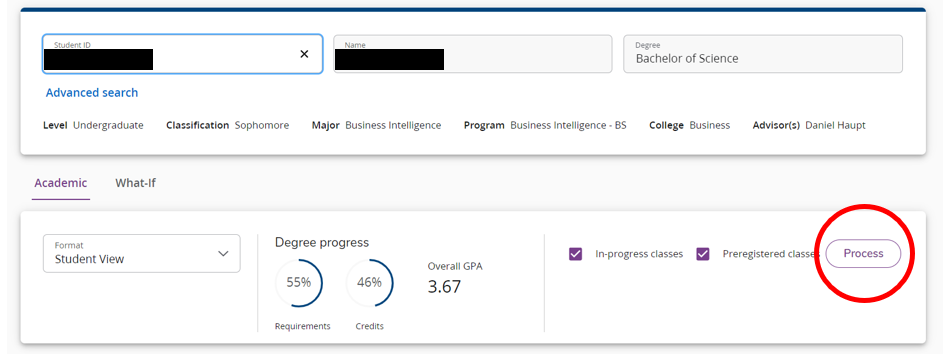
Important: Every time you load your DPR, always hit “Process” so that it accounts for any recent changes to your record.
Your Degree Progress Report can be found towards the top of your Student Hub under Web Services.
The top portion of your Degree Progress Report includes the following:
Your DPR also includes two Degree Progress Circles:
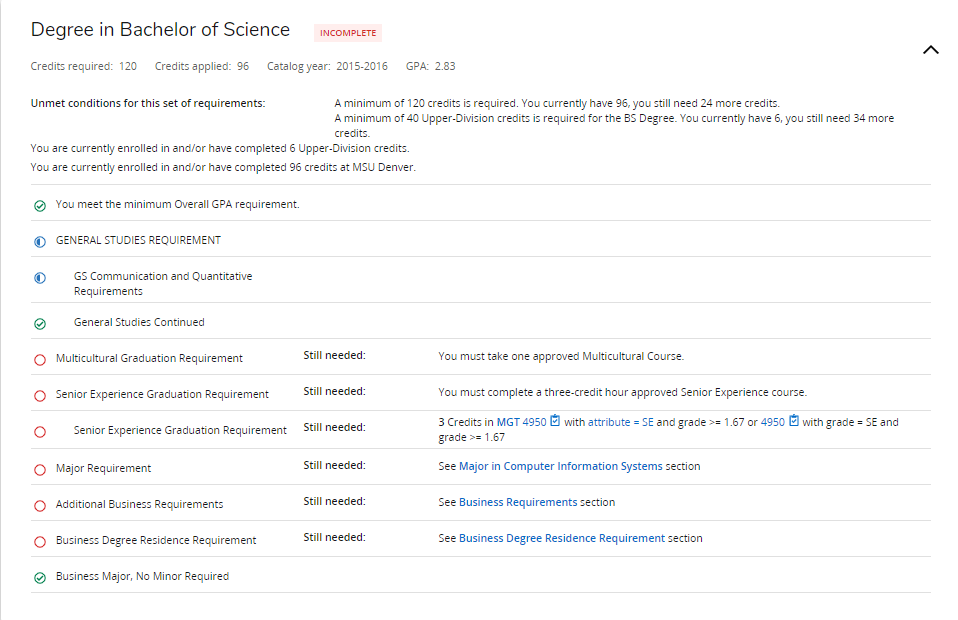
The Snap Shot section is a summary of the rest of your DPR. It shows you the following:

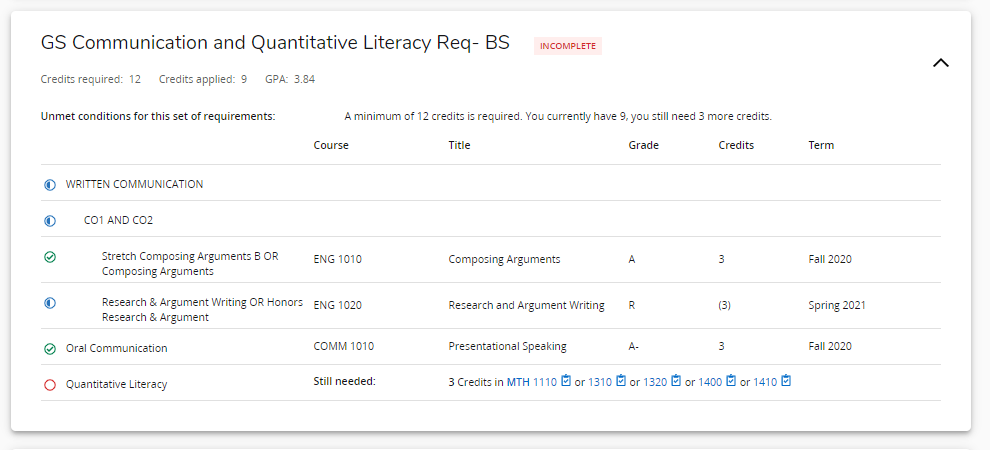

The General Studies (GS) section includes:
The first section is separated because you should complete these requirements as soon as possible; postponing these requirements can lead to a hold on your account and slow your academic progress. Completing these should always be your first priority in picking classes.
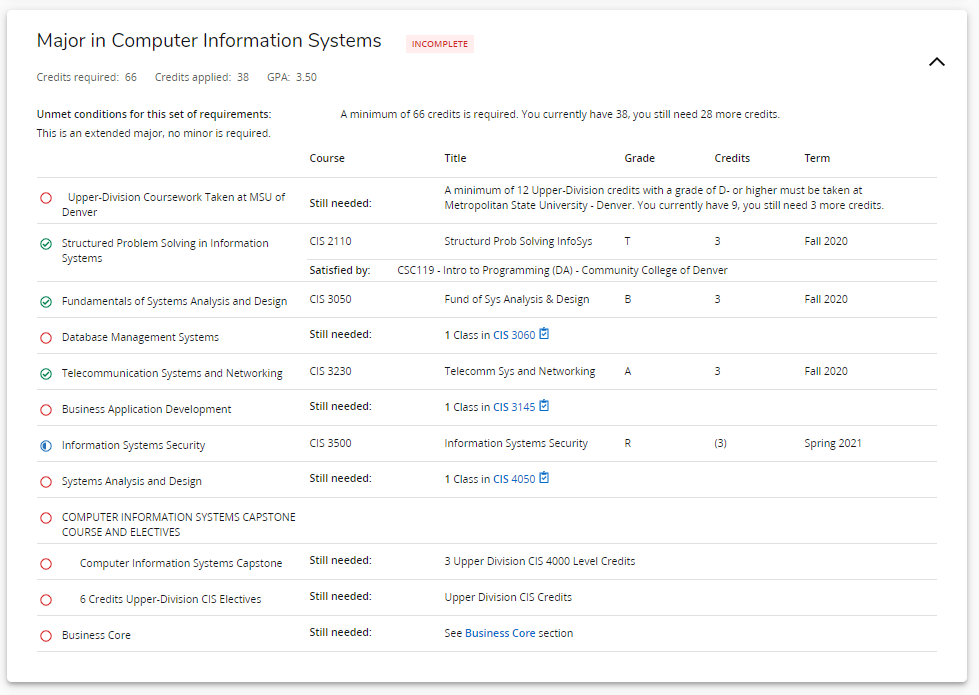
This part of your Degree Progress Report covers major specific classes and unmet conditions. In this example, this student is required to take at least 66 total credits of major classes. This number includes the Business Core (36 total credits, laid out in the next DPR section) & their CIS classes (30 credits). The number of credits may vary from Catalog Year as requirements change. This section will also show your Major GPA (all students must maintain a 2.0 Major GPA and a 2.0 Cumulative GPA to graduate).
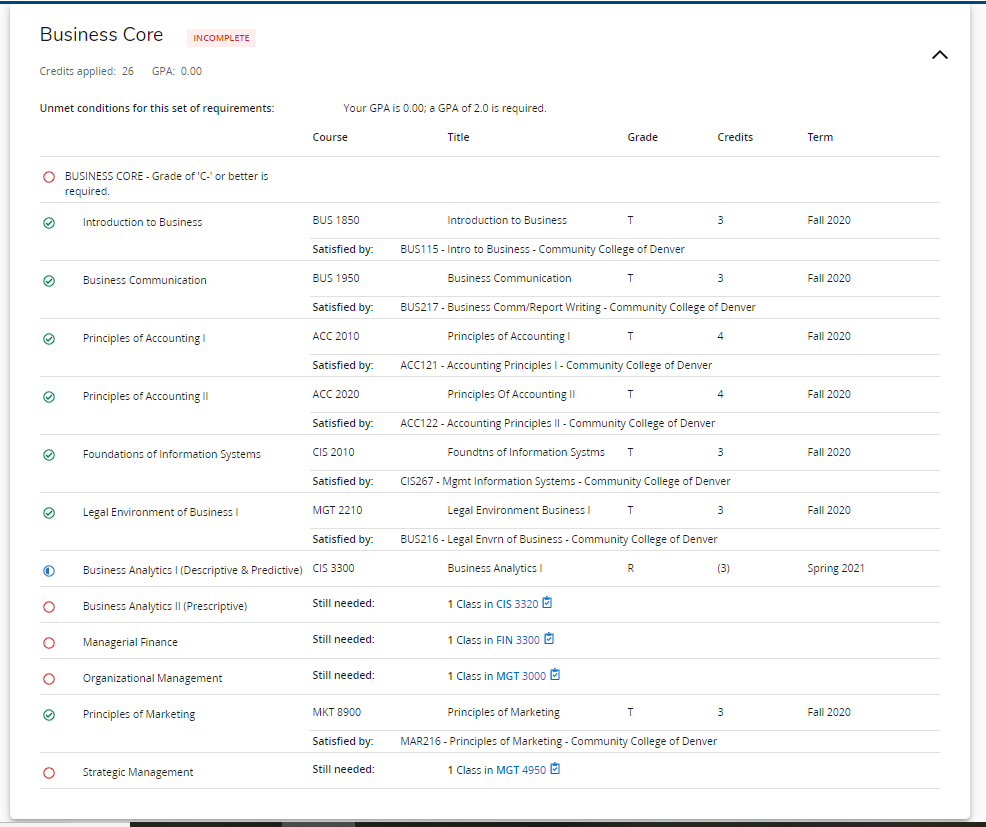
All BS students in the College of Business have to take the Business Core and earn a C- or better in each class. This section identifies the student’s completed courses. In this case, the student has completed BUS 1850, BUS 1950, ACC 2010, ACC 2020, CIS 2010, MGT 2210, and MKT 8900 (a lower division equivalent of MKT 3000). Also listed are in-progress courses (CIS 3300 in this example) and courses that need to be taken in the future.
College of Business BA students will not have a Business Core section.

Any Additional Business degree requirements will appear in Section 7. Bachelor of Science degree students with a catalog year of 2019 or later will need to complete MTH 1320 and BUS 3040.

Section 8 tracks how close you are to completing the residency requirement. All College of Business students must complete at least 30 business credits in residency at MSU Denver.
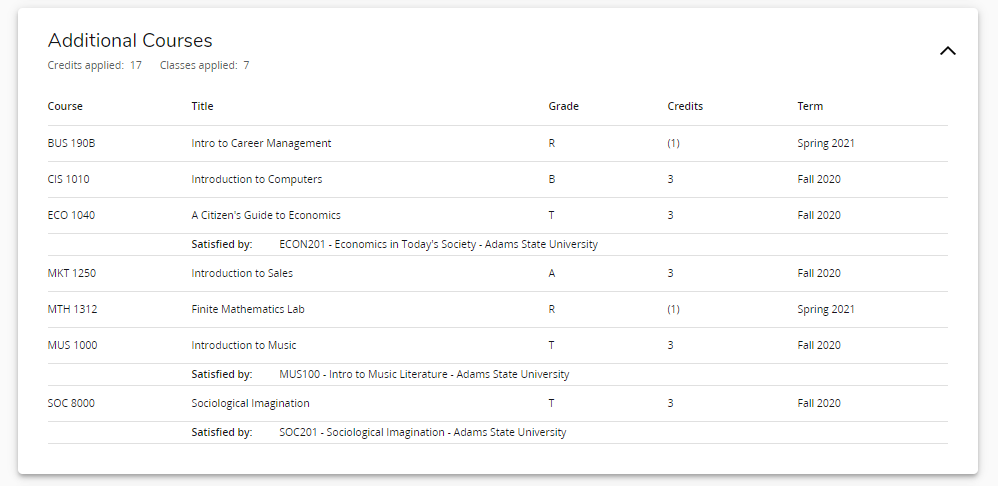
The next area lists Additional Courses which are any class that was taken or transferred that doesn’t meet a specific General Studies, Additional College of Business, Major, Business Core, or Concentration/Minor requirement. These are commonly called open/unrestricted/general electives. Typically business majors need between 15 and 20 credits of open electives to get to 120 total credits to graduate.
Transfer students: If one of your classes shows up in the Additional Courses section of your DPR, but you feel it should meet a specific requirement (for example, you took a speech class at a community college outside of Colorado and it isn’t meeting your Oral Communication requirement), you can appeal to the respective department to get course credit. See an academic advisor for assistance.

The next section is insufficient courses. In general this section includes classes in which you received an insufficient grade [F, W (Withdraw), or AW (Administrative Withdrawal)].
This block could also include classes that exceeded the total amount of transfer credits accepted by MSU Denver. For example, you took 70 credits at ACC. But because MSU Denver only accepts a maximum of 64 credits from Community Colleges, 6 credits (2 classes) would appear in the Insufficient Block.

This shows all classes you’re currently taking, the number of credits, and the current Term. The “R” for course grade stands for Registered.

This block includes remedial courses like MAT 055 or MAT 099 that were taken at MSU Denver or transferred in but do not count toward your 120 credit requirement.
Degree Progress Report (DPR) has several built-in functions including What If and future course planning features, a GPA Calculator, and Class History review.
You can use the What If function to see how your current classes would apply to a different major or program of study (including adding minors or double majors).
To use it, select the What If tab towards the top of your Degree Progress Report.
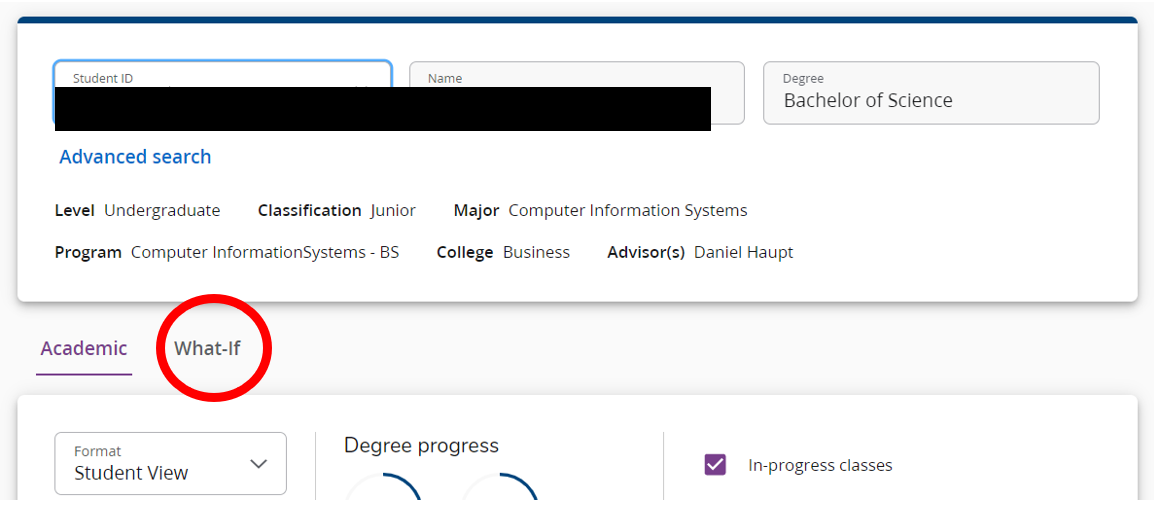
At the top of the page, select your current catalog year. Using the pull-down menus, select the program (major) you are interested in and/or add a minor or concentration.
If adding a second (double) major or new minor, click on the use current curriculum button. Select the additional major or minor under “Additional areas of study” section. Hit the Process button and it should display your new requirements.
If you want to change your major/minor/concentration, you should schedule an appointment with an academic advisor and fill out the Change of Major form (or you can fill it and submit it on-line here:
https://cbus.msudenver.edu/cbusservices/MajorMinor.aspx). During your appointment, you should double-check with your advisor about how changes might affect your progress toward graduation.
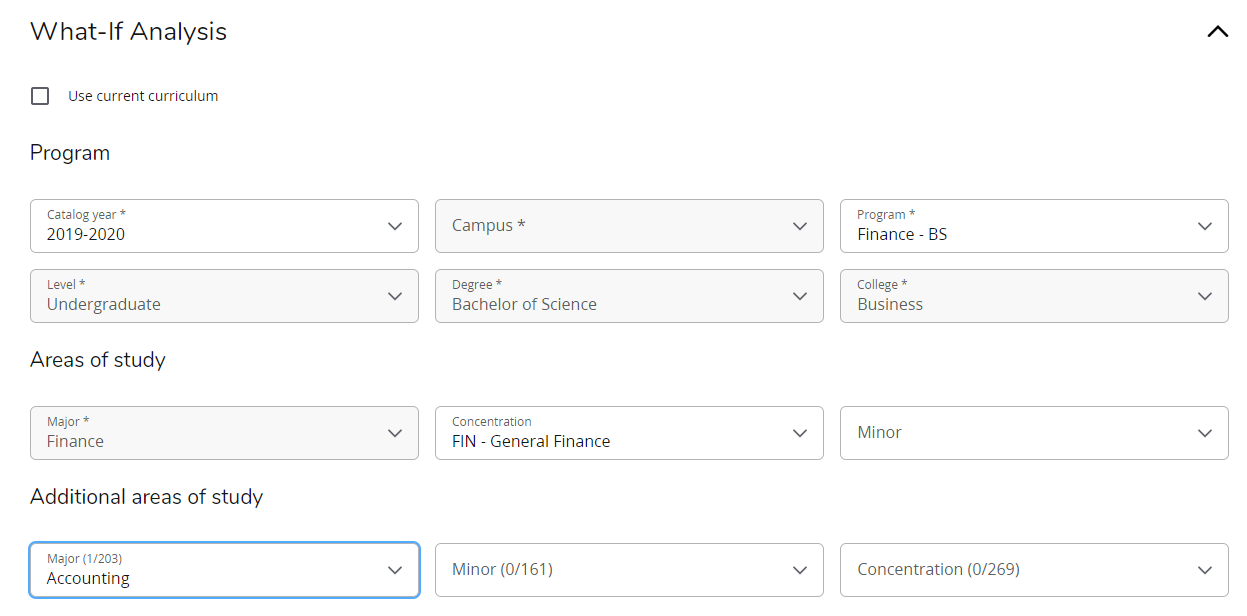
Future Course Planning Feature
You can also use the “What If Analysis” to see how future classes fit into your degree plan. Click on the Use Current Curriculum Box. Add classes by subject and number. Once you’ve added your classes, click on the Process button.
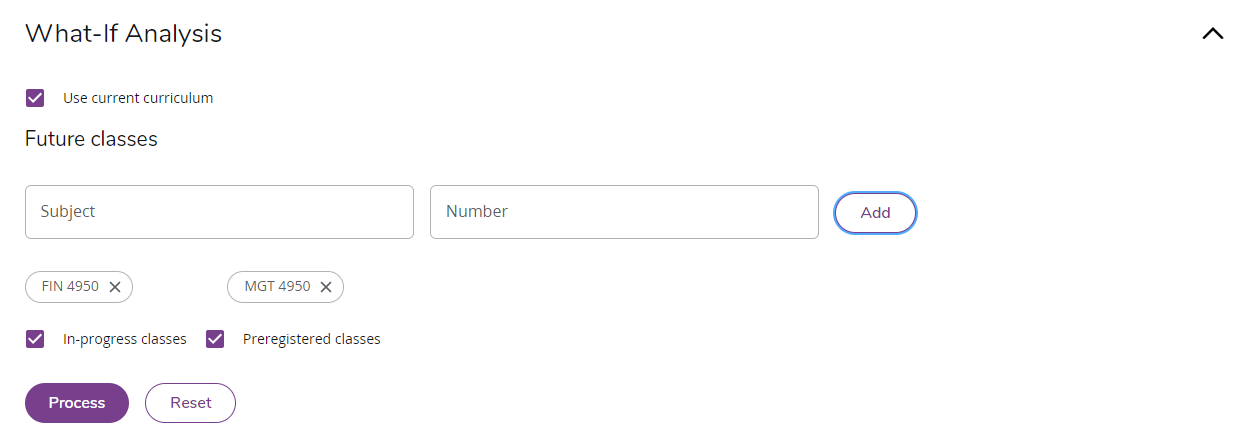
Future courses will show up as in-progress on your DPR with a PLAN for Grade and Planned Term.
How to use the GPA Calculator:
Click on the 3 dots (vertical ellipsis) next to the print and email icons at the top of your DPR. Select GPA Calculator. You can then use the Calculator to do one of the following: (1) estimate what GPA you will need to average over your remaining credits to graduate with a desired GPA (2) estimate what your GPA will be at the end of a semester and (3) estimate how many credits and what average GPA you will need in order to achieve your desired GPA. Enter required information and hit the Calculate button.

Class History Review
Click on the 3 dots (vertical ellipsis) next to the print and email icons. Select Class History. DPR will then show your courses and grades by semester.
You can also download your unofficial transcript by going to your Student Hub and clicking on Register. Under the Records tab, there should be an option to select/download an Unofficial Transcript. Official transcripts must be ordered off the MSU Denver website https://www.msudenver.edu/registrar/transcripts/
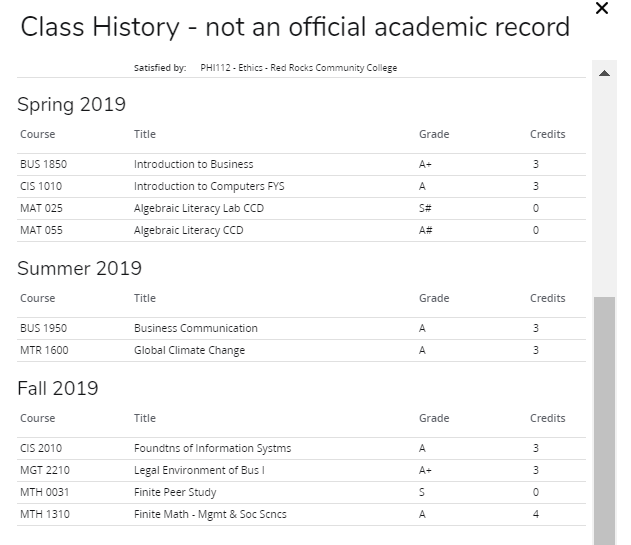
College of Business BS degree students should take MTH 1310 (Finite Math) or MTH 1311 with MTH 1312 (Finite Math with Required Lab). Except for CIS and Business Intelligence Majors, students may also take MTH 1110 (College Algebra), MTH 1108 with MTH 1109 (Stretch Algebra), or MTH 1111 with MTH 1101 (College Algebra with Lab) instead of Finite Math. CIS and Business Intelligence Majors should only take MTH 1310 or MTH 1311 with MTH 1312. If you are a CIS or Business Intelligence Major and you are transferring in College Algebra or took it before switching majors, please talk with your Advisor.
We recommend Business students take MTH 1310 or MTH 1311 with MTH 1312 instead of College Algebra. Finite Math and Finite Math with Lab prepares students for MTH 1320, Calculus for the Management and Social Sciences, and several upper division Business Core classes.
MTH 1320 (which is also commonly called Business Calculus) is an Additional College of Business requirement. It is a prerequisite for four upper division Business Core classes (CIS 3300, CIS 3320, FIN 3300, and MGT 4950) and some major specific courses (MKT 3010, MGT 3550, FIN 3600, etc.). The typical Math progression for College of Business BS degree students is MAT 055 (if required), MTH 1310 or MTH 1311 with MTH 1312, and then MTH 1320, Business Calculus.
BA degree students have different requirements. See your academic advisor for more information.
College Level Math is a prerequisite for most of your Business Core and major classes. If you do not take Math within your first semester or two, you may delay your graduation and/or not being able to take classes that count towards your Business Degree.
You will need a minimum score on one of the following standardized tests or a C- in one of the identified classes. For ALL of the following, test results/grades are good for five years.
Students with College Level Math Credits
Students transferring Business Calculus, Survey of Calculus, Calculus I, Pre-Calculus, Finite Math, or College Algebra do not need to take MTH 1310, Finite Math.
Students who took or transferred in MTH 1410 (Calculus I) or higher or MAT 125/MAT 1400, Survey of Calculus, do not need to take MTH 1320. If you took a Business Calculus class elsewhere, you may need to get the course evaluated for credit.
If you are transferring in a Math class or have Advanced Placement (AP), International Baccalaureate (IB), or Concurrent Enrollment credit for a Math course, please notify an academic advisor.
If you took either the QAS or AAF Accuplacer elsewhere within the past 5 years, you can transfer your scores in. See the Testing website for more information at: https://www.msudenver.edu/testing/
If you do not meet the ACT or SAT score requirement, your ACT/SAT scores are expired (more than 5 years old), or you took MAT 055, MAT 0300, or MAT 099 more than 5 years ago, see an academic advisor to discuss your math placement strategy. The Math Department now allows students to take MAT 0300 (Algebraic Literacy), without a required Accuplacer test.
Most students should at least try taking the AAF Accuplacer. You can take the Accuplacer twice for free at the Tivoli Testing Center, Room 347, or on-line. Check the Testing Center website for current hours and instructions at https://www.msudenver.edu/testing/. Appointments suggested but not required for on-campus tests. Bring a photo ID.
There are a number of AAF Accuplacer study guides and prep materials available on the MSU Denver Tutoring Center and Department of Mathematical and Computer Sciences websites: https://www.msudenver.edu/tutoring/ and https://www.msudenver.edu/math/math-placement-testing/
Students can also request one-on-one or remote assistance through the Tutoring Center; attend one of the periodic Accuplacer review sessions held by the Math Department; or use free outside resources such as the College Board’s Accuplacer Test Prep https://accuplacerpractice.collegeboard.org/login and Khan Academy https://www.khanacademy.org/.
You can take the AAF Accuplacer twice for free. You can retake the Accuplacer more times, but after the second time you will have to pay a fee and may be required to meet additional conditions (for example, attend mandatory Accuplacer tutoring sessions). See the Tivoli Testing Center for requirements and fees for taking the Accuplacer more than a second time. (Veterans taking the Accuplacer through Vocational Rehab may be able to take it as many times as they like for free. See your Vocational Rehab Coordinator for more information.)
MTH 1312, Finite Math Lab, is 50-minute class separate from your MTH 1311 course. The Labs are supervised small study groups. During Labs, students will receive supplemental instruction from a Math instructor, prepare for lessons and tests, and have access tutoring resources. MTH 1311 and MTH 1312 classes are paired—meaning there is a specific Lab section for each MTH 1311 class. If you placed into MTH 1310, you can still opt to take MTH 1311 with MTH 1312.
The Math Department has determined that Math Labs significantly improve student success rates in Finite Math and College Algebra. If you scored into a Lab but don’t want to take it, you can take/retake the Accuplacer for a better score. You cannot opt out if your score puts you into a Lab.
You have a few options: you can take the Accuplacer and get an objective measure of your math skills. Alternatively, you can take MTH 1320 and take advantage of MSU Denver’s Student Success Tutoring Center and other resources. You may also want to talk directly with Math Department staff for advice.
You won’t be able to register for math if you do not have ACT, SAT, or Accuplacer scores on file; have not transferred in a prerequisite course; or your transcript is still pending evaluation. If you have proof of your scores/grade (for example, you can access your SAT score via the College Board website or have an unofficial transcript), an academic advisor can give you an override to register for a Math class. However, you still need to provide official documentation (for example, send your official transcripts to MSU Denver) even with an override in place.
Because MAT 055 is a remedial course, you are encouraged to speak with your academic advisor before taking this course. You can register for MAT 055 with Lab: MAT 025 on your own, regardless of whether you even have any test scores on file. MAT 055 sections can be found under the subject “CCD Mathematics” since these courses are taught through the Community College of Denver.
MAT 055 and MAT 025 are paired courses; there is a specific lab assigned to each MAT 055 section. Paired courses have the same section number (MAT 055 01C with MAT 025 01C; MAT 055 05C with MAT 025 05C, etc.) If you do not have high enough or any test scores on file, you will only be able to register for MAT 055 sections with a “C” in the section number as these are the courses with paired labs. You will need to register for the correctly paired MAT 055 and MAT 025 sections and you will need to register for both classes at the same time; otherwise you will get a prerequisite error.
The easiest way to register for MAT 055 with MAT 025 is to use the Add/Drop/Waitlist link under your main registration page. (Go to your Student Hub, hit the Register button, and select Add/Drop/Waitlist Classes.)
If you get a registration error double check you are registering for the correct paired course. If it says, “This course must be taken with [a specific CRN],” write down that CRN and its match in the CRN boxes and try again. If you still get a registration error, see an advisor for assistance.
Because MAT 0300 is a preparatory course (meaning it is not considered College level and doesn’t count towards your 120 total credits to graduate), you are encouraged to speak with your academic advisor before taking it. MAT 0300 does not have prerequisites so you can register for it without needing test scores on file or advisor overrides. MAT 0300 sections can be found under the subject “CCD Mathematics” in the MSU Denver class schedule. These courses are taught through the Community College of Denver (CCD) and held in their Confluence Building. Please note that these courses typically have different start/end dates than MSU Denver classes to coincide with CCD’s semester. You will be also required to work with CCD Admissions to get a CCD Student ID number and access to course material via their on-line learning management system.
Note the test score/class prerequisites above. If you are required to register for MTH 1311 with MTH 1312, you can register for them at the same time using the Add/Drop/Waitlist link under your main registration page. Look up the paired MTH 1311 and MTH 1312 sections you want to take under “Mathematical Sciences” and write down the 5-digit CRNs for both (CRNs are unique course identifiers). Go back to the Add/Drop/Waitlist main menu and type in the CRNs for both sections in two of the CRN boxes along the bottom of the registration page. Hit the Submit Changes button. It should say “Web Registered.” If you get a registration error, see an academic advisor or call the Math Department for assistance.
You should take MTH 1320, Business Calculus, which is one of your Additional College of Business requirements (provided you are pursuing one of the College of Business Bachelor of Science degrees). If you are pursuing an Economics degree, you should take MTH 1210, Statistics. If you are pursuing one of the College of Business Bachelor of Arts degrees, you do not need to take an additional Math class.
Provided you received a C- or higher in a college-level calculus class—at MSU, or at another accredited school that will transfer to MSU as such—you do not need to take MTH 1310 or College Algebra. Your advisor can help you with the necessary paperwork
If you are not transferring in credit for an English course that satisfies your first Written Communication requirement, you will take one of the following: ENG 1008 and ENG 1009; ENG 1010 with Writing Studio (ENG 1001), or ENG 1010. To get into ENG 1010 (no Writing Studio), you need one of the following scores (valid for five years):
Students who do not meet these minimum scores, who do not have test results, or whose scores have expired must complete the First Year Writing (FYW) Placement writing sample, described in the following section. Consult with the English Department (King Center, Room 402) for additional information on placement options.
If you have credit for ENG 1010, you should register for ENG 1020, Research and Argument Writing. If you need an override for ENG 1010 because your AP/IB/or transfer credit hasn’t been evaluated, please visit or contact the English Department (King Center, Room 402) directly.
You can take the FYW Assessment on-line or on-campus at either the Testing Services Office in Tivoli Room 347 or the English Department in King Center Room 402. Bring a valid photo ID and student ID number. You can find instructions for taking the FYW here: https://www.msudenver.edu/testing/
Your essay will then be assessed by English Department staff (normally this takes about two weeks). The English Department will email you about which course you can take: ENG 1008, ENG 1010 with a Writing Lab, ENG 1010, or ENG 1020. You MUST respond to the email to register for an English class. You will be required to provide course preferences and sign a Financial Responsibility Agreement. Read the email carefully and follow the English Department’s directions
Occasionally, students transferring in to MSU Denver will receive credit for ENG 1020 but not ENG 1010. You will still need to take a second Written Communication course to meet your MSU Denver requirements. You can meet this requirement in several ways:
Most College of Business degree students must take either COMM 1010 (Presentational Speaking) or COMM 1100 (Fundamentals of Oral Communication). Neither class has prerequisites, so you can take them your first semester! Military and Veterans with a rank of E-5 or higher will receive credit for COMM 1010 and do not need to complete an Oral Communication course.
COMM 1100 is recommended for Global Business Studies students.
COMM 1010-Presentational Speaking teaches students how to design and deliver effective, ethical presentations. The ability to adapt to different audiences and contexts- such as professional or public situations- is emphasized. COMM 1100-Fundamentals of Oral Communication provides students with insight and tools from communication research to analyze communication situations and develop effective, ethical messages appropriate to purpose, audience, context and medium.
I’m transferring in from a Colorado Community College, which Oral Communication class should I take?
We recommend you take COM 115/COM1015, Public Speaking. This course will transfer in as COMM 1010. If you took COM 125, Interpersonal Communication, speak with an Academic Advisor.
MSU Denver students are required to take two 3-credit Arts & Humanities courses from a specific list. Starting with the 2018-19 catalog, the College of Business does not have a specific Arts & Humanities requirement, so you can take any two classes you like from the approved Arts & Humanities course list. You can find this in the General Studies Approved Courses handout or in the University Catalog.
Students should also consider taking classes that satisfy both the Arts & Humanities requirement and either the Global Diversity requirement or the Multicultural requirement. (More on each of these requirements below.) These classes are listed in the catalog under the Arts & Humanities requirement and indicated with (Global) or (Multicultural). See your specific catalog to identify such courses.
Students must take one 3-credit Historical course from a specific list. The College of Business does not require a specific Historical course, but students should consider taking satisfying the Historical requirement with a class that also meets either the Global Diversity requirement or the Multicultural requirement. (More on each of these requirements below.) These classes are listed in the catalog under the Historical requirement and indicated with (Global) or (Multicultural). See your specific catalog to identify such courses. As of the 2019-20 Catalog, only HIS 1150: Multicultural America satisfies both the Historical requirement and the Multicultural requirement.
MSU Denver students are required to take six total credits in the Natural and Physical Sciences, from a specific list of approved courses. For lab courses, such as BIO 1080 & BIO 1090, you must complete both class and lab to get Natural & Physical Science credit. Some courses satisfy both the Natural and Physical Science requirement and the Global Diversity requirement. These classes are listed in the catalog under the Natural and Physical Science requirement and indicated with (Global). See your specific catalog to identify such courses (3 classes as of 2019-20).
All CBUS majors must take ECO 2010 (Macroeconomics) and ECO 2020 (Microeconomics). For all BS students, these courses will meet your Social and Behavioral Sciences requirements. Our BA programs may require additional courses in this area; see your specific catalog for more details.
All students must take an approved 3-credit Global Diversity course from a specific list. This class can also be used to satisfy (or partially satisfy) another General Education requirement, such as the Arts & Humanities (half of 6 credits), Historical, or Natural and Physical Science (half of 6 credits) requirement.
Separate from the Global Diversity requirement, students also must take a 3-credit Multicultural class from a specific list available in the catalog. This class can also be used to satisfy (or partially satisfy) another requirement, such as the Arts & Humanities (half of 6 credits) or Historical requirement. Some of these classes could also count toward majors in Economics (ECO 3600: Economics of Race and Gender), Management (MGT 4830: Workforce Diversity), or Marketing (MKT 3750: Multicultural Marketing). (All example courses from 2019-20 Catalog; be sure to check your catalog.)
CIS 1010 is a prerequisite to CIS 2010 (Foundations of Information Systems), which is one of the Business Core classes. Alternately, students can take the CIS Placement Test, which measures knowledge of Excel and other computing skills and concepts. A score of 75% or above lets you register for CIS 2010 (once you meet other prerequisites) without taking CIS 1010 first. Information of the CIS Placement Test is available here: https://www.msudenver.edu/testing/cis2010-placement-test/.
Because of the Business Core, Additional College of Business requirements, and course prerequisites, College of Business BS students need very few open electives to get to 120 credits—usually between 11 and 20 additional open electives. Students can use these electives to earn a minor (most are 18-21 credits); a double major (each business BS major requires at least 24 credits or 8 classes); or a concentration (for example, International Business). Discuss these options with your academic advisor.
MSU Denver offers great elective options. Some make for a great change of pace, such as 1-credit Career and Professional Development (CPD) courses on Stress Management, Career Evaluation Workshop, Women’s Self-Defense, and more. There are 2-credit Human Performance and Sport (HPL) classes like Tennis, Fencing, and Yoga. (Some require additional fees.) Look up elective options by subject (Anthropology, History, Beverage Management, Drawing, Music, etc.) on the class schedule.
Here’s a downloadable PDF of the Course Recommendation Form Graduation Planning Worksheet. It looks like this:

Earn credit for what you already know! MSU Denver and the College of Business (CBUS) value college-level knowledge you have acquired outside the traditional classroom. As a result, we accept or offer the following prior learning assessment (PLA) opportunities:
Recent examples of College of Business students granted PLA credit:
Studies courses, open electives, 7 of 12 Business Core classes, and additional CBUS requirements for Bachelor of Science programs. The College of Business also offers opportunities to take Department Exams for some major courses. We have listed PLA options for CBUS course requirements below.
Potential cost savings are tremendous. The average MSU Denver 3- credit class costs approximately $1,300 (with fees and Colorado Opportunity Fund stipend applied), whereas each CLEP test costs $124 for the exam and sitting fee and department exams and sitting fees are $157 each (fees subject to change). For each PLA test passed, a student can save over $1,100 in tuition and fees.
PLA also offers students the opportunity to fast track their careers—for students on a 4-year graduation plan every 15 credits of prior learning assessment earned could result in 1 less semester needed to complete a degree at MSU Denver.
While there is no current limit to the number of credits a student can be awarded from department and standardized exams, students must still meet degree, minor, and certificate residency requirements for the College of Business and MSU Denver. For example, College of Business students must take a minimum of 30 credits of business classes at MSU Denver to be awarded a degree. Department Exams and Standardized tests are considered transfer credits and do not meet residency requirements. Students can learn more about their residency requirements by reviewing the University Catalog or by speaking with their academic advisor.
There are other restrictions on awarding PLA as well. For example, you can’t take a Department Exam for a similar college course that your previously attempted. You must also be currently enrolled in a degree or certificate program and be in good standing in order to take exams. You can learn more about applicable restrictions here: https://www.msudenver.edu/registrar/prior-learning-assessment/.
Students who have already taken National Standardized Tests (CLEP, DSST, AP, and IB exams) need to send official tests scores to MSU Denver Admissions to receive credit. There is typically a fee associated with sending transcripts. You must meet minimum scores to receive credit (for example, if you received a 3 on the AP United States History exam, you will receive credit for HIS 1210; if you received a 2, you will not receive credit). You can find score minimums and course equivalencies in the University
Catalog under Alternative Credit Options/Prior Learning Assessment (make sure you are looking at the catalog from your year; if you do not know your Catalog year, check your Degree Progress Report or speak with your advisor).
To send official test transcripts:
Only high school students are eligible to take Advanced Placement and International Baccalaureate exams—if you have already graduated from high school, you can take one of the more than 30 College Level Examination Program exams and/or Department Exams. Active Duty Military members, Air Force Civil Service employees, and Coast Guard spouses have the option to take the College Level tests for free or reduced costs through DSST (to see current DSST eligibility requirements and learn more about the program go to https://www.dantes.mil/dsst/). You can find out how your DSST exams fit into Colorado’s Guaranteed Pathways program here: https://highered.colorado.gov/sites/highered/files/2020-03/colorado-standard-dsst-exam-credit-and-cut-scores.pdf
Talk to your Academic Advisor or a Prior Learning Specialist to determine if CLEP testing is right for you (College of Business courses that have CLEP options are listed below). Once you and your advisor or Prior Learning Specialist determine which CLEPs you would like to take, follow the instructions on the PLA website for ordering/testing information: https://www.msudenver.edu/registrar/prior-learning-assessment/. Once you have completed the CLEP exam, send MSU Denver Admissions your transcript. Keep in mind, it may take a month or more for a transcript to be received, processed, and credited to your degree. If you are a graduating senior, do not wait until the last minute to take CLEP exams or you may miss your graduation window.
Departments may allow students to take Department Exams for credit. College of Business Departments currently offering Department Exams include: Finance (including Banking courses), Economics, Management, and Marketing. If you have knowledge in a business subject area, review your degree requirements and talk with the Department Chair about Department Exam options.
Prior to meeting with the Chair, you should get syllabi for classes you are considering taking a Department Exam for. Contact the Department Administrator for course syllabi—they can also provide you course textbook titles and/or suggest materials that will help you study for exams. Review the syllabus carefully and be prepared to discuss how your prior learning covers course material. Once you have Chair approval and understand testing requirements/scoring, reach out to the Prior Learning Center and follow the next steps, including a final check of eligibility, at: https://www.msudenver.edu/registrar/prior-learning-assessment/
The following is a list of CBUS Department Exams that have been previously offered:
Military and Veteran students can receive credit for their service by submitting their DD214, Joint Service Transcript, and/or CCAF Transcript to Brandy Schooler, MSU Denver’s Prior Learning Specialist. She can be reached by phone at 303-605-5574 or by email at [email protected]. The Prior Learning Assessment website can be accessed here: https://www.msudenver.edu/registrar/prior-learning-assessment/ and military specific information is available here: https://www.msudenver.edu/veterans/military-transfer-credit/
MSU Denver offers the following package of transfer credit and waivers:
U.S. military.
Some Professional Military Education and Occupations will also be eligible for credit as determined by American Council of Education Military Guide (https://www.acenet.edu/Programs- Services/Pages/Credit-Transcripts/military-guide-online.aspx)
Below is a list of General Studies and Business classes with prior learning assessment options. Know your degree requirements, particularly your Quantitative Literacy class(es), so that you do not prepare for and take the wrong exam. You can find degree requirements by major in the University Catalog, or you can talk to your academic advisor.
o CIS 1010, a prerequisite to CIS 2010, has IB and DSST options (these come in as CIS 1010 or CSS 1010). Students that have Access/Excel experience can also take the CIS Placement Test to place out of CIS 1010 and directly into CIS 2010. Passing the CIS Placement Test does not result in credits awarded for CIS 1010
Open[1] Electives. Most College of Business Students need approximately 15 to 20 credits of open electives to get to the 120 total credits required to graduate. Open elective credits can be fulfilled through PLA. Go to the Alternate Credit Options/Prior Learning section of the University Catalog to review AP, IB, DSST, and CLEP options. https://catalog.msudenver.edu/content.php?catoid=43&navoid=3174 If you are fluent in Spanish, German, or French and need open elective credits, you should consider taking a CLEP exam—you may be able to bring in as many as 16 credits.
CIS Placement Test. Students needing to take CIS 2010, Foundations of Information Systems, have two options to get into the course. They can take or transfer in CIS 1010, Intro to Computers, or they can take CIS Placement Test to place out of CIS 1010. Students must pass the CIS Placement Test with a 75 or better and meet other course prerequisites to take CIS 2010. The test is free and can be taken twice. TA Study Guide and free resources are available here: https://www.msudenver.edu/computer-information-systems-business-analytics/resources/cis2010-literacy-screening-test/
Global Business Studies and International Business Majors students who have a foreign language other than those listed for CLEP and/or AP and IB credit, may take a language proficiency test and check off the Foreign Language option in their degree plan (unlike CLEP, AP, and IB exams, the language proficiency exams do not result in college credits)
There are two language proficiency test options:
Students should check in with the Management Department Chair prior to taking any language proficiency test.
[1] Open electives may also be referred to as “general electives” or “unrestricted electives” – all terms mean the same thing.
See our Advising page.
*All CBUS faculty and advisors are located in the Administration (Admin or AD) building, which is at 1201 5th St., Denver, CO 80204.